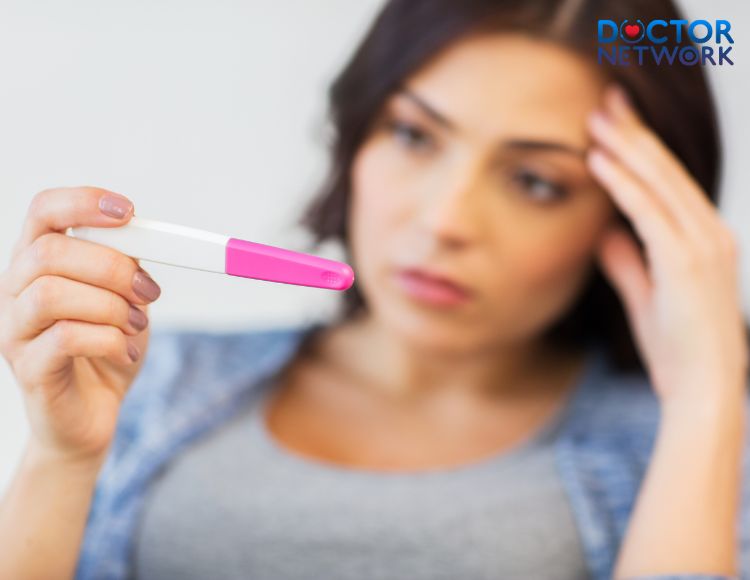Conception marks the beginning of a pregnancy when a man’s sperm successfully combines with a woman’s egg produced by her ovaries. However, not every instance of intercourse leads to successful conception. Recognizing “signs of unsuccessful conception” can help couples actively seek medical advice, understand the causes, and find appropriate solutions.
Key signs of unsuccessful conception
Normal Menstruation: Regular menstrual cycles are one of the clearest indicators that conception has not occurred. If there is a significant delay in menstruation, using a negative pregnancy test can confirm.

Regular menstrual cycles are one of the clearest indicators that conception has not occurred
Lack of Pregnancy Symptoms: Typical early pregnancy symptoms include nausea (morning sickness), fatigue, breast tenderness… If these changes are absent, the likelihood of unsuccessful conception needs to be considered.
Other signs to note
“signs of unsuccessful conception” – Unchanged Breast Sensitivity: Endocrine changes during pregnancy often make breasts more sensitive, with nipples possibly darkening. Conversely, if breasts show no signs of change, successful conception may not have occurred.

“signs of unsuccessful conception” – unchanged breast sensitivity
Post-Coital Bleeding: This phenomenon can result from various causes, including a warning sign of unsuccessful conception or other health issues. Monitoring and seeking medical attention for repeated occurrences are advisable.
“signs of unsuccessful conception” – Early Miscarriage: In some cases, early miscarriage symptoms may be confused with delayed or heavier menstruation. Special attention is needed if miscarriage is accompanied by severe abdominal pain or prolonged bleeding.
Absent Morning Sickness: Lack of nausea does not definitively indicate unsuccessful conception, but most women experience varying degrees of morning sickness during pregnancy.
Causes of unsuccessful conception
Several underlying factors can hinder successful conception, including:
“signs of unsuccessful conception” – Hormonal Imbalance: Imbalances in reproductive-related hormones can interfere with ovulation and the uterine lining’s readiness for egg implantation.
Irregular Menstrual Cycles: Difficulty determining the exact ovulation time can affect fertilization success.
“signs of unsuccessful conception” – Health Issues: Certain gynecological conditions (e.g., uterine fibroids, endometrial polyps), thyroid disorders, or chronic illnesses can negatively impact fertility.
When to see a doctor?
After trying to conceive naturally for over a year without success.
If over 35 years old, seeking medical advice after 6 months of trying.
Experiencing unusual symptoms like irregular menstruation, severe abdominal pain, or abnormal bleeding.
Important Advice
“signs of unsuccessful conception” – Avoid Self-Diagnosis: The mentioned signs are for reference only; consulting a specialized doctor is necessary to accurately diagnose your condition.
Equip Yourself with Pregnancy Knowledge: Understanding menstrual cycles, ovulation, and how to calculate ovulation days will assist in family planning.
Maintain Peace of Mind: Psychological stress can also affect fertility. Couples should share concerns and seek support from loved ones when needed.

Maintain peace of mind
Some questions related to “signs of unsuccessful conception”
Here are 5 frequently asked questions closely related to the topic of “signs of unsuccessful conception“ along with their corresponding answers:
1. How long does it take to recognize signs of unsuccessful conception?
“signs of unsuccessful conception” – Typically, the most obvious sign is when menstruation occurs normally. Regular menstrual cycles indicate a high likelihood that conception did not occur during that cycle.
You can also use a negative pregnancy test after a week of missed period for more reliable results.
2. Does the absence of morning sickness mean unsuccessful conception?
Not necessarily. Although nausea, fatigue (morning sickness) are common symptoms of pregnancy, not everyone experiences these symptoms. Some pregnant women do not experience morning sickness, or it may be very mild.
To be sure, you should track your menstrual cycle and use a pregnancy test if you miss your period.
3. Is light bleeding after intercourse a sign of unsuccessful conception?
Light bleeding (or spotting) after intercourse can be due to various reasons, including benign changes in the cervix, infection… and sometimes it can also be a warning sign of unsuccessful conception.
You need to monitor further and visit a doctor if the condition repeats or other abnormal symptoms occur.
4. Does irregular menstrual cycle affect the chances of conception?
Yes, irregular menstrual cycles make it difficult to accurately determine the time of ovulation, reducing the chances of successful conception.
If you have irregular periods, you should see a doctor to check, determine the cause, and find appropriate supportive methods.
5. What should I do if the signs indicate unsuccessful conception?
First of all, don’t worry too much. Unsuccessful conception over a few cycles is normal.
If you and your partner have been trying to conceive naturally for over a year (or 6 months for women over 35) without success, seek evaluation and advice from a fertility specialist together.
Some scientific evidence on “signs of unsuccessful conception”
Here is some scientific evidence on “signs of unsuccessful conception”:
1. Reference: “Normal menstrual cycle and menstrual disorders” from the National Institute of Child Health & Human Development (NICHD) (https://www.nichd.nih.gov/): Regular menstrual cycles are a strong sign of successful ovulation and the possibility of pregnancy. When women have regular menstrual cycles, it indicates that the uterine lining has been prepared for the implantation of a fertilized egg. Conversely, irregular menstrual cycles may disrupt the ovulation pattern, reducing the chances of successful conception.
2. Reference: “Urinary pregnancy test: Evaluation of current and future technologies” published in the Journal of Clinical Investigation (https://www.jci.org/): Urinary pregnancy tests detect the presence of human chorionic gonadotropin (hCG) hormone, a hormone produced by the developing placenta during pregnancy. Home pregnancy tests, when used correctly, can provide accurate results within a week after a missed period. A negative pregnancy test result after a missed period indicates that conception has not occurred.
3. Reference: “Early pregnancy symptoms and signs” from the Mayo Clinic (https://www.mayoclinic.org/): While not all women experience early pregnancy symptoms, some common signs include nausea (morning sickness), breast tenderness, fatigue, and frequent urination. The presence or absence of these symptoms may provide clues to the likelihood of pregnancy. However, it is important to note that these symptoms can also be caused by other factors, such as premenstrual syndrome or stress.
4. Reference: “Bleeding in early pregnancy” from the American College of Obstetricians and Gynecologists (ACOG) (https://www.acog.org/): Light bleeding or spotting immediately after ovulation, called implantation bleeding, can sometimes occur when the fertilized egg implants into the uterine lining. However, heavier bleeding or passing clots may indicate early miscarriage.
Early recognition of signs of unsuccessful conception plays an important role when you are trying to conceive. Actively seek reliable information and consult with a fertility specialist is the right step to get appropriate support/treatment, helping to make the dream of a complete family a reality soon.
References:
https://fertilityfoundation.org/identifying-symptoms-failed-implantation/
https://www.webmd.com/infertility-and-reproduction/understanding-infertility-symptoms
Kiểm Duyệt Nội Dung
More than 10 years of marketing communications experience in the medical and health field.
Successfully deployed marketing communication activities, content development and social networking channels for hospital partners, clinics, doctors and medical professionals across the country.
More than 6 years of experience in organizing and producing leading prestigious medical programs in Vietnam, in collaboration with Ho Chi Minh City Television (HTV). Typical programs include Nhật Ký Blouse Trắng, Bác Sĩ Nói Gì, Alo Bác Sĩ Nghe, Nhật Ký Hạnh Phúc, Vui Khỏe Cùng Con, Bác Sỹ Mẹ, v.v.
Comprehensive cooperation with hundreds of hospitals and clinics, thousands of doctors and medical experts to join hands in building a medical content and service platform on the Doctor Network application.

























